#Grape Growing Methods
Explore tagged Tumblr posts
Text
Moon Magick
What Is A Moon Magick?
In many cultures around the world, practitioners have used the position of the moon, as well as the phases of the moon in their practice. Each phase of the moon is perfect for certain types of magickal workings. Not all witches depend on the particular moon phase. Many develop their own methods and techniques through trial and error to find out what works best. Those that do use the timing of the moon do so by choosing the moon phase most conducive to their magickal workings. This gives their magickal workings some extra lunar energy boost.
Correspondences:
Associated deities: Isis, Diana, Artemis, Morrigan, Holda, Nyx, Nephtys, Sedna, Lilith, baba, Yaga, Kali, Aphrodite, Freya, Ishtr, Hathor, Selena, Oshun, Perspephone, Flora, Cerridwen, Gaia, Epona, Yemanja, Rhiannon, Khonsu, Inanna, Hecate, ...ect
Animals: owls, rabbits, wolves, deer, cats, moths, bats, spiders, raccoons, opossum, cows, frogs, dogs, crabs, whippoorwill, panther
Crystals/Stones: moonstone, selenite, obsidian, silver, mother-of-pearl, aquamarine, gold beryl, topaz, emerald, clear quartz, coral, pearls
Moon Associations: Shadow work, Protection, Meditation, Journaling, Introspection, Strength , Love, Beauty, Manifesting, To attract new things, Purification, Letting go, celebrate your accomplishments, letting go, goal setting, banishing
Plants and Herbs: vervain, moonflower, jasmine, lemon balm, cabbage, camellia, camphor, chickweed, moonwort, gardenia, grape, lemon, passion flower, turnip, potato, pea, cucumber, pear, peach, willow, poppy, mountain ash, mango, wallflower, rowan, cactus
Moon Phases
New Moon
This is the crescent Moon when see the first peak of light, this is a time of newness, the beginning of relationships, the beginning of a new venture, the energy of this phase promotes new beginnings on any level. This is the time for change and for being open to, and looking for new opportunities, tilling the soil and planting seeds actually, and the seeds of ideas.
Waxing Moon
The Moon is beginning to gain strength as it grows in size, and goes from a new to a full Moon, this is a perfect time for growth and increasing things, growth within a relationship, financial growth, a time for learning and gaining knowledge.
If someone is thinking about pregnancy, this is a time of fertility, and it is an exceptional time for communication, in a business matter, or within a relationship. This is also an auspicious time for any legal matters, especially those where finances are concerned, if a healing spell, or healing of any type is needed, this is the time.
Waxing Gibbous
During the phase of the Gibbous Waxing Moon anything to do with increase is compatible; this is a good time for minor magic as the lunar energy is waning.
Full Moon
The full Moon is the most powerful phase, this is when the Moon is seen in its glorious fullness, this is a time of enlightenment and heightened psychic awareness. It is a time when everything comes together, it is a time of ideas, also a time of commitment, to a person, idea or project. It is also a time of family, and or friends coming together, any spell is well aspected during this phase of the Moon.
Waning Gibbous
The Waning Gibbous Moon is suitable for rituals associated with letting go, and banishing, if it is time to clear out the old and prepare for the new, this is the Moon phase to spell craft with.
Waning Moon
As the Moon decreases in size, it goes from full to dark, and this is a time of letting go, it is also a time of completion. If you have been wanting to change something in your life, this is the perfect time.
It is also a time of ending anything that doesn’t work in your life, this may be a habit, a relationship, or paying attention to issues associated with legal matters, this is a time to pay attention to anything that you have been procrastinating about
Moon Water
Moon water is very similar to Sun water. But rather than being charged by the sun, it’s charged by the moon. Moon water can be useful for helping boost the energy of a spell, to help an intention grow, protect and to cleanse a space.
Instructions:
Get a glass bottle
Fill it with any type of water.
Leave the bottle with water out in the moonlight for a whole night.
#thecupidwitch#witchcraft#witches#witch#witchcore#grimoire#witch community#witchblr#green witch#pegan#wiccablr#wicca#occult#book of shadows#magick#peganism#moon#moon phases#baby witch
542 notes
·
View notes
Text
CockCo’s New App

Ted had seen the ads for the new app going viral. It was advertised as a photo enhancement app, one that was supposed to be better than photoshop.
As soon as Ted opened the app, it prompted him to take a photo.
“What would you like to enhance?”
The app was almost comical in its simplicity.
“Snap a pic and we’ll do all the work!”
Ted laughed. This app was totally fake. He pointed the camera down at his lap where his shorts were hiding a measly 4 inches and grape sized nuts.
“Awesome! Now choose the enhancement percentage!” Ted was next prompted with a slider from 100% to 500%. He found it strange that there wasn’t any option for less than 100%, but he shrugged and laughed, jokingly opting for 500%.
“Awesome! Now choose payment method!” Ted wasn’t expecting this. The app was free and the app store didn’t say there would be in-app purchases.
The options were “Brains!”, “Height!”, “Muscle!”, “Hair!”, “Smell!”, “Endurance!”, and “Confidence!”. And in very small text at the bottom of the screen there was a sentence that read, “All enhancements are positive and permanent and are subject to CockCo’s terms of service.”
Ted was really confused now, so far nothing had changed about his photo, and if all of these ‘payments’ were positive then why was it payment?
Ted selected all of the payment methods, the check boxes lighting up with different colors as he went. He laughed again at the silliness of the app and pressed “continue”.
“Awesome! Now sit back, relax, and watch!”
The app then showed his original photo, his lap in full view. The app showed a little swirling ball next to the words, “Enhancing”.
Ted’s eyes widened as he saw the image of his pants begin to change. His zipper seemed to bulge out farther, along with the shorts digging further into his thighs and waist.
What Ted saw next made him drool. His cock, starting at 4 inches hard, began to snake along his waist. His grape sized nuts inflating too, pushing out against the fabric of his shorts. He watched as it slowly reached his hip, pushing through the pocket and inverting the fabric. As his balls continued to inflate he suddenly noticed he was in a lot of pain. He looked down and saw that his shorts — or rather his body — now matched what he saw in the photo… constricting around his balls, confining his enormous cock, and hugging his muscular ass and thighs.
Ted let a deep moan as his shorts tore in half, releasing his growing manhood. His new stench was now wafting up at him, his mind getting foggy from the smell… or was it from something else? He couldn’t tell, his brain was in his balls now, full of potent cum ready to blow.
God he looked so good. His orange sized balls filling up, his beer can thick footlong cock, his ass bouncing as he stood up, his new pecs jiggling too. Inches were adding to his height, making his body look more like a greek god’s than a burly lumberjack’s. His mind was filling with his new body’s hormones and thoughts. Thoughts of fucking, getting fucked, sucking and cumming.
He took a deep breath in, inhaling his now pungent stench, slowing his mind more and making him leak precum like a faucet.
He reached one of his enormous hands down and grabbed his dick, his other hand reaching between his juicy cheeks and rubbing his super sensitive hole.
It was too much. Within seconds he was cumming. And wow did he cum. He launched huge globs of creamy, smelly, jizz all over himself. But as the last of his cum slowly dripped out of his massive apple sized cock head, he felt his balls swell bigger, his body was already getting prepared for round two.
Ted loved the new app.
1K notes
·
View notes
Text
Food in Dawntrail
Gonna go ahead and share my thoughts on it as posted on twitter, excuse the format!
I found the prevalence of food in DT's MSQ very interesting. In a lot of cultures, food and food-sharing are acts of love both familial and neighborly. It also symbolized a desire to reach out and understand one another, from xibruq pibil to tacos to ice cream to weird grapes.
Our first encounter with food in DT is when Wuk Lamat wants to give us some tacos, but then BJJ smashes them carelessly, a sign that he is rejecting sharing and love
During the lay of repast, which is ALL about food, we learn a lot about the symbolism of meals and food and culture. It's great.
Zoraal Ja and Bakool Ja Ja are teamed up and shown to not understand or care about food and sharing despite the BLATANT emphasis on it in the trial.
More subtle stuff that isn't called out is the way food is raised - like the Crystarium, where wandering around can reveal the importance, if you wander around DT you can find an example of what's called the three sisters method of farming.
For those unfamiliar with this system, it's actually a very culturally important method of farming in the americas where 3 staple crops, maize, squash, and beans, are grown together in a harmonious fashion. and i mean TOGETHER.
The maize, which grows tall and strong, provides support for the beanstalks which curl around it and provide stabilization both physically and nutritionally. At their feet grows the ground-covering squash which shades the soil, keeping it moist and preventing weeds.
The next major time we learn of food and agriculture is in heritage found, where we see people preserving real food as an act of culture more than anything else, showing the resilience of culture and the spirit of sharing in even the most lightning riddled situations.
After that it gets interesting. The concept of food in S9 is abstracted into the absurd (the grapes??? help), but they still share the food. More than that, it's a SPECTATOR sport, seeing WoL and Wuk Lamat eat. If you've ever been to a dinner with a family of a different culture, you will know the experience of tasting a new cuisine for the first time, and people asking you what you think of it. They share their culture with you and hope you approve. It's the sharing of joy, and it's the same as when you eat in S9.
Then we're REALLY challenged. We enter living memory and find the inhabitants feasting on the mere idea of food. They share with us as well, giving us popcorn. Did you lie and say it was great? Did you speak the truth of your tastebuds and reject the popcorn?
The food in living memory is tasteless to us, the only real ones in the place. But the act of sharing, that was the real important part. And so perhaps if WoL lied, it was not to spare feelings, but to show that yes, they were sharing in joy and culture.
Thus introduced, we are hit with that ice cream. We know it tastes of nothing, but we give it to Krile and her parents to share. Krile knows it doesn't taste like anything, and she struggles. But G'raha zips in with his own, to make her laugh and help her understand the joy.
The way each character reacts to food within DT is symbolic and shows a bit of their own perspectives. Someone who's very out on the edges, Estinien, is also someone who has embraced food very heavily after being freed from Nidhogg. He runs around eating everything in sight now.
And of course we also have the cornservant, who wants to feed everyone. I haven't actually done that quest line yet but I can already tell you what's at the heart of it XD
A lot of this we all know, I'm just calling it out specifically because it was beautifully done in DT.
Oh, before I forget: Otis and Gulool Ja
Otis, despite being, er...mechanical, has been feeding Gulool Ja. It is a familial act, feeding and helping this child grow despite zero relation.
is it just another fetch quest? Another shared meal of many shared meals in the field? Or is it asking us to look at this meal in the context of all that came before it?
What does it mean to love and care for one another? Otis shows it by being there and feeding Gulool Ja.
It contrasts with two other parties: Cahciuna's group, and Zoraal Ja.
Zoraal Ja does nothing. He does not feed his child. Abandoned him outright. ZJ rejects family, love, and sharing.
Cahciuna's group is trying really hard to take care of him, and he does allow it because they keep finding and taking him home. But why does he run away to eat with Otis? Cahciuna's response to realizing he WANTS to leave is to allow it instead of insisting.
I find that rather mysterious but I think it shows Gulool Ja prefers organic sharing, not S9 where everything is simply handed to him. Hopefully we see more of him in the future so we can learn wtf is up with this little blue-scaled cutie.
Food takes a background role in a lot of stories but DT took it, explained it, and then challenged our understanding by taking away the most talked about component, stripping away flavor to ask us what the point of food-sharing really is and how it reflects ourselves & our culture.
We've seen a lot of these themes before - ARR used to have a whole thing about feeding the soldiers before the assault on the garlean strongholds, SHB had the infamous rhon ron food stand scene, etc
we just got it called out repeatedly and the concept gently deconstructed for us in DT.
So. what does the act of food-sharing mean to you? What does it mean to your WoL? How did you see the Lay of Repast? What did you think of the popcorn?
#dawntrail spoilers#Dawntrail#food in dawntrail#squapes#dawntrail analysis#there are a lot of details in MSQ if you slow down and take the time to look#final fantasy xiv#ff14#7.0 spoilers
221 notes
·
View notes
Text
DC x PJO
Alfred Pennyworth Son of Dionysus.
Okay I know this is gonna be a controversial one but hear me out. A lot about Alfred history/past is unknown and it is often left as a mystery. But if I remember correctly he fought in a war. Now let's say this war was like what happened in WWII in the PJO books which is that it was a demigod war that was also a mortal war but in one.
Either way he fights in the war and decides to retire into a semi peaceful life (demigods life can never be truly peaceful) so he asks his father for advice on how to achieve such a thing. Dionysus then guides him to Gotham City, a city full of madness, addiction, religious ecstasy and more. Since he is the main patron god of the city his son could live a (mostly) peaceful life where his demigod scent would be hidden by the stink of the city and he would have access to many of his father's domains which are essential to a demigod.
Now Pennyworth decides to follow in his mortal family footsteps in serving the Wayne family. This also has the added benefit of providing even more protection and closeness to his fathers domains because the Wayne family are one of the founding families of the city and have plenty of blessings from his father that has passed down for generations.
Years of serving the Wayne family and yet despite living with the world's greatest detectives they have yet to discover his godly parentage.
Every, or almost every child of Dionysus has a drink they are "addicted" to and Alfred is no different. Thankfully his preferred drink is tea which not only is good for your health but also socially acceptable. He does carry packets of instant tea and a flask of iced tea. He doesn't like them as much as real tea but he has them in case he finds himself cut off for whatever reason.
He has a garden in the Wayne grounds where he grows all kinds of foods and vegetables but his favorite and more treasured are the grapes. Grapes which he would use to make a special wine that is served to the Wayne in Galas. This wine has the effect of providing a relaxed state that doesn't take away alertness nor inhibits one's decisions.
Alfred is often found using his abilities to keep the family from falling into insanity. His presence alone helps keep his father's domains away but with the life they lead and the trauma they get from it he genuinely has to work on keeping them as sane as he can. Offering drinks created and brewed by him to heal and maintain sanity has been his main method. Food works too but it isn't quite as effective.
If this hasn't convinced you yet I will be writing a second part soon. But first I need to sleep cause I have work and I should be sleeping by now. Part 2 is coming soon.
#dc universe#percy jackson#pjo x dc#batfam#gothamites#greek gods#alfred pennyworth#dionysus#son of Dionysus
41 notes
·
View notes
Note
🧟🧟🧟🧟🧟🧟🧟🧟🧟🧟🧟🧟🧟🧟🧟🧟🧟🧟🧟🧟🧟🧟🧟
69 for 🧟:
---
They clink their bottles together, rip into a bag of potato chips, and get to drinking. They start their evening relaxing on the very expensive sofas in what appears to be a home theater. There isn’t any power to use the damn thing, but they find some candles to light, and enjoy the plush, comfortable surfaces anyway.
The thing about drinking when you haven’t drank in months and you’re not eating as much as you should to conserve food, is that it hits you. Hard and fast. Buck has probably had the equivalent of half a glass by the time his brain is fuzzy and everything feels sort of silly. For Eddie, it seems to happen even sooner. Judging by the sudden onset of laughter that is truly verging on giggling.
It’s like they’re teenagers again, at their first house party. And quickly, that becomes evident in more than just the easy buzz.
It starts with simply shifting closer to each other on the couch. They’re still playing their little post-apocalyptic game of Would You Rather. Except, it’s kind of lost the thread.
“Okay, you can sleep in a king sized bed with fresh sheets every night forever,” Buck asks. “But every shower is cold. No warm water ever again.”
“Easy. I prefer warm water,” Eddie replies, voice a bit slurred.
“That easy?” Buck asks. Still thrown by Eddie’s quick decisiveness.
“Too many cold showers in the military. Plus, who wants to sleep in a king sized bed alone?” Eddie replies.
“All that room to starfish!” Buck protests.
“I don’t starfish!”
“Well, maybe because you sleep in tiny beds! You should try it tonight, man. Take the master. Live a little.”
“Live a little while I’m sleeping?” Eddie asks. He’s staring at Buck very intensely, face illuminated by the dulling candlelight. They must have let a few flames flicker out without noticing.
“Yeah,” Buck exhales, returning his gaze. “Or, you know… While you’re awake.”
“While I’m awake,” Eddie repeats. “I like the sound of that.”
Buck nods. Maybe a little too eagerly.
He doesn’t actually know what to do now. He’s drunk. He’s horny. He has absolutely no experience trying to seduce men. He hasn’t seduced anyone in over half a year. Buck is entirely lost.
Eddie takes another small sip of wine, watching the uncertainty play out on Buck’s face.
“I can’t tell what you want,” he says quietly.
That’s fair. Buck doesn’t know how to vocalize what he wants. He wants to know. The curiosity is absolutely killing him.
“I…” Buck tries, leaning a bit closer. “I kind of want whatever you want, right now.”
“Oh,” Eddie breathes. “Good.”
Suddenly they’re kissing. It’s not slow or methodical or very romantic. It's an intoxicated frenzy. It tastes like red wine. It feels incredible.
Buck drops his bottle of wine. Doesn’t even worry about the fact that it’s spilling. Eddie does the same. There are limited bottles of wine left on earth and limited people to ever grow new grapes or harvest the stuff, and there they are, spilling the expensive shit because this one kiss has infinitely more value.
Buck is entranced. He’s feverish.
16 notes
·
View notes
Text
Forestry
I posted earlier this summer about some tree thinning my son was going to do down at Home Farm. There is an area that was clear cut around 2008, and it has grown back in many, many saplings that are crowded and need more space.

If you look toward the back of the picture, you can see that the young trees are packed so close together it's almost hard to walk through them. Over time, many will die off and some will survive. We can speed that process up, though, by thinning. We have used two methods, crop tree thinning (where we pick trees to keep, spaced 25 - 35 ft apart, then cut the trees in a ring around the crop tree) and area-wide thinning, which is what this is. Son marked off roughly an acre and cut more than half the trees, leaving the rest with much more sunlight and room to grow.


It's crazy how many he cut when there are so many still there! He'll certainly have plenty of material for his next bonfire. Most of the wood will be left to enrich the forest floor and feed the mushrooms. A couple years down the road, this site will have much taller trees than the unthinned areas. The trouble is, given the steep slope, grape vines, bees, and other impediments - it took him 40+ hours* to do this one acre. Even if he speeds up with practice, which he will, that's still a lot of time. How many acres could use this thinning treatment? Oh, probably about 50.
'* and several bee stings
20 notes
·
View notes
Text
GETTING INTO 2025.
in this post i will lead you through the steps that i have used before and that have served me best, but keep in mind that this is just a method and everyone has a different way of doing that like simply eating grapes under the table(WHICH IS TOTALLY FINE).
LETTING GO
write down all the people, situations and energies that do not define you anymore and you have the intuition of letting go in the past.
they could have helped you transform, but that doesn’t mean they should stick with you. it’s good to think about what they helped you learn about yourself and how they have let you grow.
in order for that to be translated into the physical world you can either burn the paper sheet, throw it somewhere, or just tear it to little pieces. it may seem a bit off and weird but making sure that you physically let go of everything written down on that paper could have an impact on your psyche and help you overcome everything that is drawing you back from being your best self.
thus you are entering the new year, having a clear space for what is to come. making sure you declutter your energy opens space for everything that is meant for you to experience. a good tip is embracing not knowing what is it to come and trying to see where you can work in order to make peace with what is in store for you.
REVISIT
1.HABITS
start with what you think is best for getting closer to that best version of yourself, whilst being realistic about what you can really give your time to in your day to day life.
2.PRINCIPLES
is your value system still serving you?, has your previous year tried to show you where it lacks or where it needs to be worked on? try to establish a connection with your truths without blaming yourself for your mistakes.
3.GOALS
this one is self-explanatory. there are multiple sources from where you can create vision boards or mood boards. but my advice is to make everything personal based on the previous bullet points try to assemble your goals list, without trying to stick some kind of aesthetic like “clean boy/girl”, “sigma male”, “dark femme” or etc. try to see what your personal beliefs about life show you…
SIDE NOTE:
in all those three bullet points i have revisited those four spheres of my life:
1.personal growth
2.health
3.relationships
4.career
NOTHING IS CERTAIN
of course you should have a clear mindset about where you are headed, but keep in mind that we are not always the ones who know what’s best is best for us. the divine sometimes has something different in store for us in order to help us grow and prepare us for the best. therefore, always remind yourself that what you are going through is the best, because it teaches you. embrace it and try to be present. all your goals can wait until you are ready. be humble
#selflove#blog#111#it boy#it girl#self help#self love#self care#growth#mindfullness#self growth#nye#new year#project 2025#new year 2025#journal#journaling#journaling prompts#goals
11 notes
·
View notes
Text
Alcohol Traditions, 2
Before it fell to the Mask of Winters, Thornsish aperitifs were exported far and wide through the Inland Sea as luxury goods. The Red Iron Rebuke's armies burned down many of the fields which once produced Thorns' most famous aperitif wines. From the ashes, a new strange thing has arisen, a pale ghostly fungus which grows here and there among the green-white grapes planted in the death-tinged ashes. Using the same methods as used for botrytized wines made with mundane grape rot, these new grapes can be made into a crisp, nearly clear wine which glows slightly with blue ghostfire light in the dark. The wine is sweet and refreshing and has no ill effects on mortals who drink it, and has quickly become a favorite among those who can grow it; perhaps even in sad, dark places like Thorns, beautiful new things can still be found.
21 notes
·
View notes
Text
He dreamed of a career in the Israeli military. Instead, ironically, he co-created an iconic cereal brand which bears a distinctly military name and rank — Cap’n Crunch. The man behind the cereal is food technologist Chaim Gur-Arieh. He not only was on the laboratory ground floor bringing Cap’n Crunch to supermarket shelves, but Gur-Arieh brought us multiple other blockbuster brands and products — Hidden Valley Ranch Dressing, Tiger’s Milk Bar, single serving pudding and gelatin cups, and wine coolers.
Ninety-year-old Gur-Arieh is a non-stop innovator not only of foods, but of himself. He’s lived on three continents and pursued three distinct careers. Born in Istanbul, Turkey to a family that traces its roots there to the 1500s, he moved on his own at 14 to Israel. A high school dropout, his hopes of a life in the Israeli army ended when an explosion caused a hearing loss. Undeterred, he returned to school and earned a B.S. in chemical engineering.
In Israel, Chaim changed his last name from Mizrachi, a common name there, to Gur-Arieh, meaning “lion cub.” But this wasn’t the only change he made. After working at a rubber factory, Gur-Arieh decided chemical engineering wasn’t for him, he explained in a recent interview. So, he reinvented himself once more. He moved to the U.S., earned a master’s degree and Ph.D. in Food Science at the University of Illinois, and became a food technologist.
His first job was at Quaker Oats Company in the Midwest. It was there Cap’n Crunch was born. At the time, Quaker Oats had another cereal on the market. It also had a problem. That cereal, Life, was infringing on a patent owned by Ralston Purina Company, according to Gur-Arieh. So, Quaker Oats needed an alternative manufacturing method, and while working on one, came the idea of developing a sweet cereal for children, namely Cap’n Crunch.
While Cap’n Crunch is famed for its sugary taste and distinctive cartoon character, Gur-Arieh’s contribution was technical and industry trend setting. He co-developed the cereal’s manufacturing process called extrusion, the mechanical process when grain is forced to flow — under one or more varieties of conditions of mixing, heating and cutting �� through a mold which shapes and/or puff-dries the grain. Before extrusion became the most common method of processing cereal, grains were typically rolled.
In the six decades since its introduction by Quaker Oats (now a subsidiary of PepsiCo), the popular corn and oat cereal has spun off into numerous flavors and seasonal variations, including ones with berries, “vanilly,” peanut butter” and “choco.”
As for Gur-Arieh, he too spun off into multiple ventures. He worked for Del Monte Foods and a company developing food for astronauts. After that, he ran his own companies and along the way hit another gastronomical home run — developing Hidden Valley Ranch Dressing or more accurately the dressing as we dip and devour it today. Years before, ranch dressing had gone to market in dry mix packets, but Gur-Arieh created the bottled liquid formula convenience-loving consumers didn’t know they craved.
About this time, Gur-Arieh took on a partner-for-life, his wife Elisheva. After 35 years in the food business, at an age when many people might consider retirement, Chaim and Elisheva opted to fulfill a longtime dream of opening a winery. Their Di Arie Vineyard & Winery, located in the Sierra foothills outside of Sacramento, CA, grows 11 varietals of grapes. In addition to the vineyard, there’s a tasting room and a wine club. Chaim makes the wine, while Elisheva, a nationally exhibited artist, oversees sales and marketing.
Now, 24 years into operating the winery and having just celebrated his 90th birthday, you might ask when does the man behind Cap’n Crunch start resting on his laurels — or at least on his vineyard? The answer: Not yet.
Since COVID, the vineyard faces new challenges and Gur-Arieh is innovating once again to meet them. Sales are down and consumer tastes are changing, he explained.
“First, there’s a general decrease in the amount of wine people are drinking. It’s partially an economic decision, but it’s also generational,” he said. “Younger drinkers are turning away from wine and back to hard liquor and that’s having an impact.”
To combat the downturn, this nonagenarian inventor has created three wines that pair with sushi. This new Hikari line is being marketed to money-spending younger foodie fans to win them back to wine. It has three offerings including a specially formulated chilled red wine blend and comes in bottles and cans – again, a nod to a younger demographic. Hikari is already sold in supermarkets in the West and Gur-Arieh is negotiating with a major Midwest chain to place Hikari there.
And with that update on his business, our interview concluded. The man who never lost his stride, be it during relocation from country to country (or continent to continent) or industry to industry, put on his floppy hat and headed out the door. There were grapes to tend to, watered and watched. Another day of work for this constantly innovating continually enterprising food scientist-turned-vintner.
11 notes
·
View notes
Text
Elements: Air Edition




About the air element: The air element is linked to things such as divination, concentration, visualization, and prophecy. Air teaches us how to hone our scattered energy and focus it toward what we want. It teaches us to use our intention. Air can be a big cleanser and also a big charger. Just stand outside for a few momenrs on a windy day, letting it blow around you and play through your hair, and you will feel renewed.
Air in magic: The air element is often used in combination with smoke, feathers, trees, flowers, and plants. It is common to use the air element in both spells that require letting go, and in spells that bring you new information. After all, rumors can travel on the wind. Aromatherapy, hanging objects up, playing the flute or other woodwind instruments, and tossing things to the wind are all examples of using the air element in magic.
Forms of air include: wind, still air, breath, vibrations
Some air spirits include: Sylphs, zephyrs, faeries
Color: Yellow
Direction: East
Tools: Censer, athame, sword, wand
Tarot suit: Swords
Zodiac signs: Gemini, Libra, Aquarius
Symbol:

Air in daily life: The most obvious form of air in our daily lives is the air that we breathe. Everyone does it, everyone needs it. Speaking requires the element of air as well, as it carries the vibrations of our voices. We use air to cool off, and every time we look up at the clouds in the sky, we are interacting with the air element.
Air in the home: Similarly to how fire is used to keep our homes warm, air is used to keep them cool. Whether you are opening a window, turning on a fan, using an air conditioner, or fanning yourself with the playbill for your little brother's school performance of Legally Blonde in the stuffy auditorium, you are using air to cool yourself down. Air can also be very healing. How many times have you stepped outside to get some fresh air and take in the breeze while you were feeling sick?
Air in the kitchen: Though it may not be obvious at first, there are some cooking methods that utilize the air element. Perhaps the most common is drying, whether you are drying meat for jerkey or herbs for tea. Then there is cooking with convection heat, which is growing more popular, or cooking with microwaves. Also popular, as seen by the amount of fizzy beverages and whipped toppings available, is carbonation and aeration. There are several foods and ingredients associated with the air element, including~
Almond, anise, bamboo, brazil nut, caraway, chicory, dandelion, endive, hazel, hops, lavender, lime, mace, maple, marjoram, mint, mulberry, parsley, pecan, sage, acorn squash, artichoke, bitter melon, broccoli, cauliflower, eggplant, fennel, okra, rhubarb, spaghetti squash, alfalfa, cannelini beans, lima beans, mung beans, celery seed, chamomile, rosemary, scallions, amaranth, puffed rice, rye, apple, apricot, blackberry, currants, lingonberry, pear, pineapple, tamarind, pomegranate, black tea, chocolate, coffee, white vinegar, cabbage, celery, grape leaves, mustard greens, daikon, sunchoke, parsnip, hibiscus, macadamia nuts, walnuts, stevia
Herbs associated with air: Frankincense*, myrrh*, pansy, primrose, vervain, violet, yarrow, dill, clove, acacia, aspen, beech, benzoin*, bodhi, bracken, bromeliad, clover, fern, goldenrod, horehound, houseleek, mistletoe*, papyrus, pine, slippery elm, tobacco, rose petals
Stones associated with air: Fluorite, moonstone, turquoise, amethyst, rhodochrosite, topaz, pumice, alexandrite
Animals associated with air: Doves, hawks, eagles, foxes, turtles, ravens, spiders
Incense: Lavender, lemon balm, linden, frankincense, myrrh, violet, anise, chicory, mace, pine
Air on the altar ideas: yellow feathers, feathers in general, bird imagery, incense, censer, bells, flute, objects hanging above the altar
Divination with the air element: Nephomancy, austromancy, alveromancy, feather divination
Air work for spoonies:
Open up the window to watch the sky
Collect feathers or scatter them to the breeze
Keep a handheld fan nearby for when you need to create a breeze of your own
If you dont have your own windchimes, ring bells or listen to recordings of chimes on your phone
Use yellow pillowcases, blankets, sheets, curtains, or wall decorations
Hang beads or ribbons in your window
*Some herbs are unsafe or even deadly to ingest and can be dangerous to use. ALWAYS do research.
Sources:
#witchcraft#witch#witchy#witchblr#elements#air#air element#herbs#kitchen witch#cottage witch#air witch#gemini#libra#aquarius#crystals#divination#spoonie witch#wind#breeze#windy#wind witch#sky#sky witch
86 notes
·
View notes
Text
LoZ - Gerudo vs Egypt
I can't help but wonder what Ganon & just the Gerudo in-general's reaction to Egypt at the height of its power would be.
If you really think about it, you never really see a settlement in LoZ that's more than a hamlet based upon population alone. Not a single one even truly qualifies as a village despite their names.
But Egypt wasn't just a kingdom. It was an empire, one of the greatest on Earth. And if I'm not mistaken, their cities were big.
And they didn't just survive, they thrived. Despite the desert.
They had some terrible practices, but boy if they weren't tenacious.
It's also weird that you never see an agricultural area of any kind among the Gerudo. I know that I've beaten this over the head a bunch, but so long as you have ready access to fresh water & know the correct planting method, you can grow a lot of stuff in the desert.
Carrots, radishes, cucumbers, squashes, pumpkins, beans, farrow, wheat, dates, figs, tomatoes, spinach, cabbages, grapes, sweet potatoes, sweet peppers, & such. Not to mention the obvious coconuts, cacti such as agave & dragonfruit & aloe, as well as watermelons. All these things grow in the desert just fine. Some of them having canonical counterparts within the game such as Hylian Tomatoes, Fortified & Sun Pumpkins, Hearty Radishes, Swift & Endura Carrots, Hydromelons, Palm Fruit, Voltfruit, & Tabantha Wheat.
Plus, there's the stuff that we know grows there because we see them growing there. Hydromelons, Voltfruit cacti, Wildberries, Zapshrooms, Warm & Electric Safflina, Spicy Peppers, Dazzlefruit, Palm Fruit, & Shock Fruit.
So, since BotW/TotK Gerudo have access to a seemingly endless source of water, then add to that the straw grid planting method, they should be thriving.
And I don't understand why they aren't.
Perhaps the development team don't know much about desert ecology?
Not that it wouldn't be difficult. Heavens, no! At the same time, I've never seen the Gerudo as lazy by any account. They'd need to be incredibly resilient & hardworking to live where they do without growing their own food.
In such a situation, I can definitely understand Ganondorf's... frustrations. Doesn't make his actions in any way okay, but I can understand why he'd be envious of his obviously thriving neighbors.
I will admit, part of the problem was, indeed, most likely on Hyrule's part for not giving some sort of aid, but that doesn't mean that that the Gerudo were blameless.
LoZ Cultural Masterlist 2
14 notes
·
View notes
Text
@aesthetic-writer18
Part 1: a economic overview of Ancient greece
Greece had pretty poor soil. They relied heavily on agricultural trade for food and their economy was reliant on imported goods. They grew olives and grapes, which were complimented by herbs and vegetables. Husbandry was badly developed, consisting mostly of sheep and goats while bees were kept for honey, which was the only source of sugar known to the greeks. Up to 80% of the Greek population was employed in the agricultural industry. Agricultural work followed the rhythm of the seasons: they harvested olives in autumn while trimming and keeping grapevines during the autumn seasons and the end of winter, while settings aside fallow land(land set aside so that it can recover nutrients) in the springs, harvesting cereals in summer and cutting wood, sowing seeds, and harvesting grapes into autumn, where the cycle would repeat. Greece had fairly mild but wet winters with hot and dry summers: typical of other mediterranean countries.Craftsmanship in greece was very much a big part of their domestic sphere(social circle), at least early on. Later around the 8th and 4th century BC(800 BC – 701 BC and 400 BC – 301 BC respectively), it moved to a more commercialized zone. Things like weaving and baking were done solely by women before the 5th century BC, before slaves were used after the expansion of commerce. Workshops were mostly family-operated and employed up until around 429 BC, following the death of Pericles, when a new class of wealthy owners and managers of workshops emerged.
Another aspect of greece’s economy was pottery. The greeks used the same method of pottery used since the bronze age. The potter's work consisted of selecting the clay, fashioning the vase, drying and painting and baking it, and then applying varnish. Part of production went to domestic use in things such as plates, containers, and lamps, commercial use for selling, and the rest served an artistic function. Pottery was often done by slaves and a few skilled artisans.
Greece practiced free trade, though later regulations were put in place to manage the trade of grains, flour, and bread. Maratime trade in greece was conducted by class of traders known as Emporoi. The state collected a duty(tax) on the cargo of Emporoi, which at Piraeus, the main port of Athens, was set to 1% or higher. One of the main drivers of trade in Ancient Greece was colonization. As larger city states set up colonies, there would be trade between the founding city and its colony. Furthermore, different climates in these colonies created a comparative advantage in goods. The growing amount of trade in greece led to new financial techniques being developed. Most merchants lacked sufficient cash assets to fund their expeditions, and as a result, had to borrow money to finance part or sometimes all of their expeditions. A loan for a large venture in athens was generally a large sum of cash(usually less that 2000 drachmas, the greek currency of the time), lent for the duration of the voyage, which typically lasted several weeks or months, and had a high rate of interest. This interest rate was often set at 12% but could reach up to a 100% interest rate. These terms were always laid out in writing. The lender bore all of the risks; in exchange, the trader committed all of their cargo and fleet. These were often seized upon arrival to Piraeus as a precautionary measure.
Greece's main exports were olive oil, wine, pottery, honey, and metalwork. Imports included grains, pork, fine pottery, eels, and pulses from Sicily, Arabia, Egypt, Ancient Carthage, and the Bosporan Kingdom. While peasants and artisans often sold their wares, there were also retail merchants known as kapeloi. They grouped into guilds and sold fish, olive oil, and vegetables. Women would sell perfume or ribbons, and merchants were required to pau a fee for their space in the marketplace. The general population viewed them poorly. Aristotle labled their activity "a kind of exchange which is justly censured, for it is unnatural, and a mode by which men gain from one another.” Greece also apparently didn't directly tax their people. The Eisphora was a tax on the very wealthy, usually only levied in wartime. Particularly large fortunes were subject to liturgies: the support of public works. The Diaspora was another form of tax which only applied to the wealthiest. The citizens could reject the taxation, however, if they believed someone else was wealthier and not being taxed. The wealthier would have to pay for the liturgy. On the other hand, indirect taxes were quite important. Taxes were levied on houses, slaves, herds and flocks, wines, and hay, among other things. Shopping centers in greece were known as Agoras. early in Greek history free-born citizens would gather in the agora for military duty or to hear statements of the ruling king or council. Every city had its agora where merchants could sell their products. Prices were rarely fixed, so bargaining was a common practice.
5 notes
·
View notes
Text
I want to make a story on a girl that while in a vacation to Holly Greece's island of Rhodes, goes back in time to Ancient Rhodos, & basicly some generated content...
[Request: You are in vacation in Greece on a pitoresque island filled with history. Suddenly something happens & you are brought in a parallel world some thousand years before... you took the place of a nice housewife... you go to an oracle you just heard of & ask how you can leave it. & it tells you that in order to leave you have to live there by a year & follow the customs of the place from the mid of summer till the final day of the year... get all the details clear, what she has to do by day & weeks each months, the special ocasions, etc... ]
I. the Oracle talks...
Here is the detailed response from the Oracle on how you can leave this parallel world and return to your own time:
⚡️"Greetings, weary traveler from the future. I have heard your plea to return to your own time, but the path is not an easy one. In order to leave this world and find your way back, you must fully immerse yourself in the customs and traditions of this time for the duration of one full year, from the middle of summer until the final day.
🌞 Your journey shall begin on the Summer Solstice, the longest day of the year. On this day, you must participate in the grand celebration honoring the gods of sun and harvest. Join the villagers in feasting, dancing, and giving thanks for the bountiful season ahead.
🍇 As the days grow shorter, you will find yourself in the midst of the grape harvest. This is a time of great activity, as the villagers work tirelessly to gather the ripe fruit and prepare the wine that will sustain them through the colder months. Lend your hands to this important task, learning the traditional methods passed down through generations.
🍁 With the autumnal equinox, the harvest season reaches its peak. The village will hold a grand festival, with colorful processions, elaborate costumes, and rituals to honor the change of seasons. You must immerse yourself fully, embracing the customs and traditions, even if they seem foreign to you.
❄️ As winter approaches, the pace of life will slow, and the people will turn their attention inward. This is a time of reflection and reverence. You must observe the sacred holidays, such as the Winter Solstice, with the utmost respect and participate in the rituals and ceremonies that have been practiced here for centuries.
🌱 When the first stirrings of spring arrive, the village will come alive once more. This is a time of renewal and rebirth, and you must celebrate the awakening of the land with the same enthusiasm as the locals. Help to prepare the fields for planting, tend to the livestock, and welcome the return of longer, warmer days.
🌅 Finally, as the Summer Solstice approaches once more, you will have completed the full cycle of the year. If you have embraced the customs and traditions of this world with an open heart and a willingness to learn, the Oracle will deem you ready to return to your own time.
🐍Be warned, however, that the journey back may not be an easy one. You may find that the lessons and insights you have gained in this parallel world have forever changed your perspective, and the return to your own time may be bittersweet. But trust in the wisdom of the Oracle, and have faith that you will find your way back, forever transformed by your experiences in this ancient and mystical land."
Lit me hearing the voice of an air-plane assistant that says things like put your belt on & get ready to flight.... i could have some alternating moments, like she dreams of something like wandering on some stony terrain, there is super hot, she takes some water from a lil bottle (ploscă) to drink, then she realisezes, there's no more... then she hears a strong melodious voice, sounding as from afar, the sweet lady on the microphon calls her to reality, anouncing the start of the flight...
She arrives at the destination, the way s not that important (too much researching!!!). & then she has to wait for her parents to do something... then they're going on a village way to her grandparents (fatherside) & then she stumbles on a mistery box... there she finds & reads out loud the story of an ancient hunt with the beautiful tradition of Ancient Rhodes (surprisingly it has English translations.. huh, tourist friendly i suppose, yeah, our lady can hardly speak/read/understand any greek, & she's first time at her fatherside grannies, of whom she was totally unaware till recently, nor even of her father did she knew - bravos mama, but that's another story..)

(Nice, Bing... I guess it shows how she reads translation).
Have a lot more but ig 4 first part is enough...
Including of rituals s gotta be a must, so if anyone could help, & would like to, id love to hear it, u could message me ^^
📍The aim of the story: s to motivate myself to learn on the ancient customs (im aware there's gonna be a lot of made-up things, cs there's no way i could sit through it all, to have it as authentical as for example Umberto Eco or Mark Levi would have it...) & to discover a new style of writing...
.....
Oh, kinda missing my old wattpad days, not the bugs tho :// & i dont have the energy i used to have aroud 2016-18... & this is def super deep... had an older wapp account i lost, but it still exists... there i got my first failure at writing & saving one of my works which was not a random book, but a fanfic.. & the action happens in there, cs the star i wanted to make it about s from there, n namely Saloniki, chose Saloniki cs a metropola & not Athens (back then, i learn Greece has two metropolas, if meanwhile got a third, or i had wrong infos, im sorry, dk 😆). Meanwhile, learnt the guy's from there, namely. Had no idea back then, n for some reason didn't bug to check to my shame, or so i remember...
The first narration line -well and the only till the sinking- is focused on a Cypriot girl, her aunt, Nane (who btw, lately i decided s gonna be of Turkish descent, cs why not) & her two friends one of the names i remember is Nike & the other i decided meanwhile was gonna be Suzy, cs i simply forgot her name.. & they got an interesting story, i think i saved it... i also put a school in there, where they all 3 finished high school... but that's for another time... need to find and retrieve from my lil roleplay w chat gpt... & ik it's gonna be sooo maddening, 1st to find all that, then to retrieve...
Wish me luck, in all...
Here a nice Asphodel Meadow, meaning that there is more than what meets the eye... ^*)

2 notes
·
View notes
Text
As a resident brown thumb, and beginner gardener I cannot emphasize enough how important it is to invest in perennials.
Yes it takes longer for a perennial plant to mature, (about 2 to 3 years if it's in a pot) but you can definitely grow annuals while you wait and won't even notice, I am TELLING you it is so so worth it guys trust me.
You'll have Fruits/nuts/berries/herbs/leafy greens for years to come after one install and very minimal upkeep.
Perennials also tend to be hardier and more forgiving when it comes to beginner gardener's in my experience as well.
My method is to always purchase 1-2 perennial plants On Sale for every 5-8 annuals i plan on growing that year. It may be a little expensive if ur just starting out, so 1 perennial + 3-ish annuals would suffice.
Plants do well when they're companion planted so it saves u time, energy, and pesticides to get recommended combinations.
My first year didnt count, I only planted a solid block of irish potatoes of the same variety. It was a plague of bugs and disease. Don't do that, always get Companion Plant combos.
So let's go over a 4 year garden plan to get an idea, when you know what you're doing.
The 1st year I started with: a blackberry bush kit. The kit had 2 blackberry plants in it, I got it from Sams Club. I planted them in cheap plastic pots.
-a grapevine kit (Red seedless and Concord pair I also from the same Sams club). I didn't know what a mycellium network was so I thought the roots molded and threw them away, I still feel the sting from that waste but i was able to buy a Disease resistant grape variety online and plant it in the same pot. But dont be like me.
-And for my annuals that year I went with a salsa garden combo kit (peppers, cilantro, tomatoes, basil) that I got from Lowes. I harvested the salsa ingredients that whole summer.
-The second year
i bought an Italian plum tree, and for my annuals, I planted a Salad kit.
By that time, the Blackberries were mature and I was able to harvest blackberries for the first time.
This year, the 3rd year I've expanded my kitchen garden to include a salsa garden, and the 3 sisters combo (squash, beans and corn planted in the same place).
The grapevine I planted is now mature and will give me grapes in the late summer.
I'm on my second year of blackberries.
The Plum tree will be ready next year. And I haven't decided on what to plant yet.
The fourth year It will probably be a greek salad combo kit (tomatoes, red onion, basil, parsley, garlic) with a tea garden kit (rosemary, lemon balm, chamomile, lavender, mint). By this time My plum tree will be mature and I will harvest my first year of plums, my third year of blackberries, and my second year of grapes. And for my two new perennials, I will go with two apple trees for $10 each online.
By That Time I will harvest my 3rd year of blackberries, my 2nd year of grapes and my 1st year of italian plums.
So that's how it works!
Grapes, blueberries, raspberries and blackberries are cheap and widely available from big box stores during planting season, whereas fruit trees are cheaper and healthier when ordered online outside of planting season but pre-ordered for the next year, in my experience.
(this could be berry bushes, a fruit tree, a nut tree, a fruit vine, or a perennial herb you just have to shop around) They mature faster when you plant it in a pot, and you grow however many annuals you want that growing season.
I'm so focused on the routine spring radishes and summer tomatoes, that two adhd business days (seasons) later and boom
"now I have fresh blackberries this season too."
"Oh what's this? Now I have grapes to go along with this year's harvest"
COCAINE can't beat that high, check your growing zone and buy that f*cking dwarf tree.
22 notes
·
View notes
Text
Chapter 2 Trivia
Let’s get that fluid!
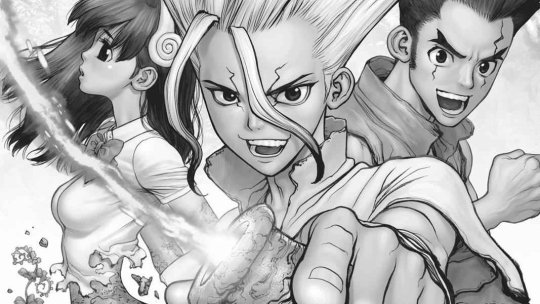
The ultimate forager made sure to rinse the dirt off his hands before eating. Perfect stone world table manners!


Senku trusts Taiju's stamina, but obviously doesn't trust his identification skills. Senku had prepared a comparatively larger basket for the inedible plants before he'd even started sorting.
Senku uses the word "primeval" here, meaning "earliest time in history", which going by the previous chapter meant ~2M years ago.
In fact, proof of salt production only appeared ~6000BCE during the Neolithic period (=beginnings of agriculture rather than hunting and gathering) which makes sense, because you'd want to preserve the harvest you worked so hard on!

Despite 2/3rds of Taiju's previous haul coming back poisonous, he doesn't hesitate to try the grapes.
Why sour? It's October, the end of the grape harvest. Either the seasons are later, or, more likely, the grapes haven't gotten enough sun to ripen because of the forest canopy.

The only things Taiju and Senku have in common here are the fact they were both conscious and near a source of nitric acid.
I wonder if anyone else happened to have these extremely unlikely odds work in their favour...

Nitric acid made from bat guano doesn't drip from the ceiling. It's actually formed on the cave floor where the droppings can decompose into nitric acid, if it's kept moist. Normally it would seep directly into the rock layer, causing erosion.
This truly is the Cave of Miracles.
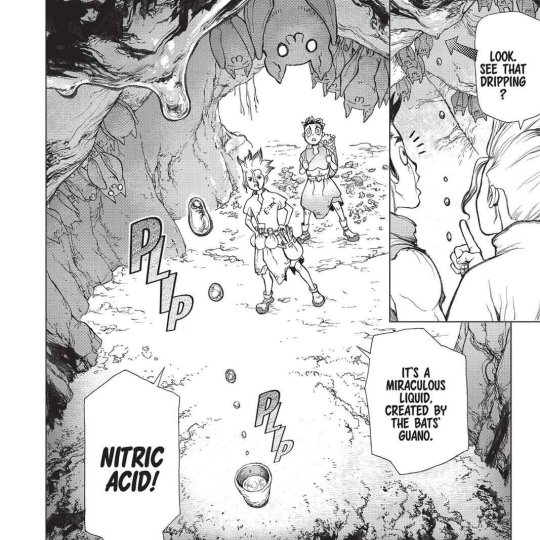
All the birds shown here are either in flight, or taking off. Could they have seen the beam coming, but no humans could? They all seem to be adults despite getting petrified during nesting season, where are the babies?
Do the eggs/embryos also get petrified?
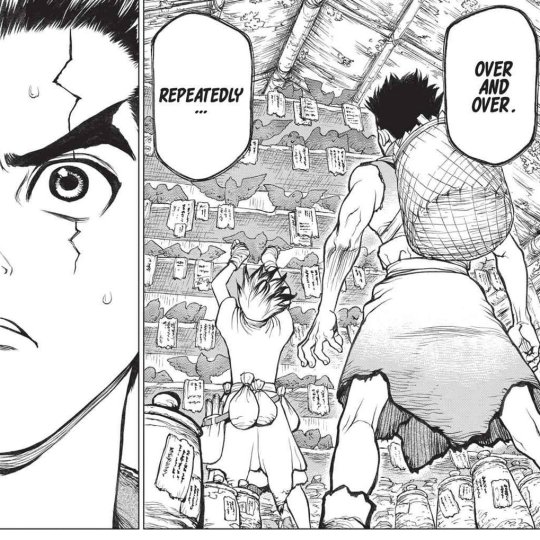
The kanji on the bottle say "daiginjo," which is the highest-quality, premium grade of sake. To call your product daiginjo, 50% of the original rice grain has to be polished away (lesser grades require less polishing).
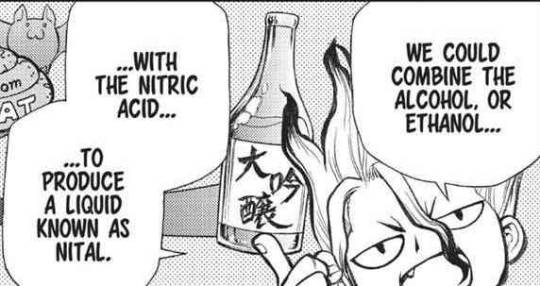
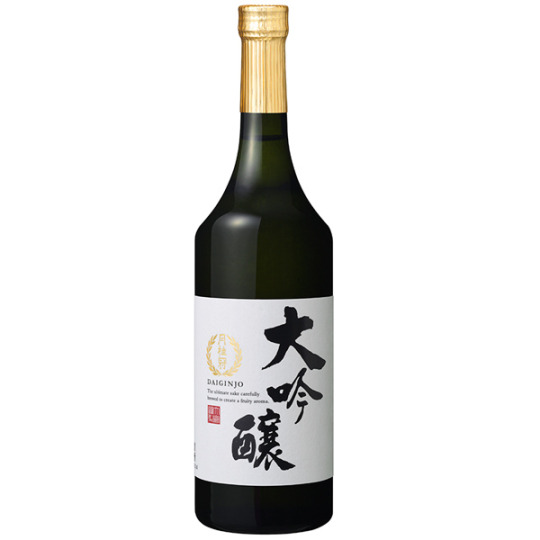
You can make wine like this but it's not recommended. I won't go into details, but 70% of fermentation is done in the first few days, and after those few days an airlock is recommended to not contaminate it. 3 weeks seems a little long for their method, but I've never tried!

Taiju has a cup, but Senku gets a clay wine glass? Why didn't Senku make a set for them? It's not like Senku can take advantage of any of the benefits of a wine glass in this situation.

It's been speculated that the Mesopotamians were using distillation for perfumes and aromatics rather than for drinking alcohol. Either way, distilling alcohol to drink only came about in the Middle Ages (~13th century) where, unsurprisingly, it was lauded as beneficial medicine.
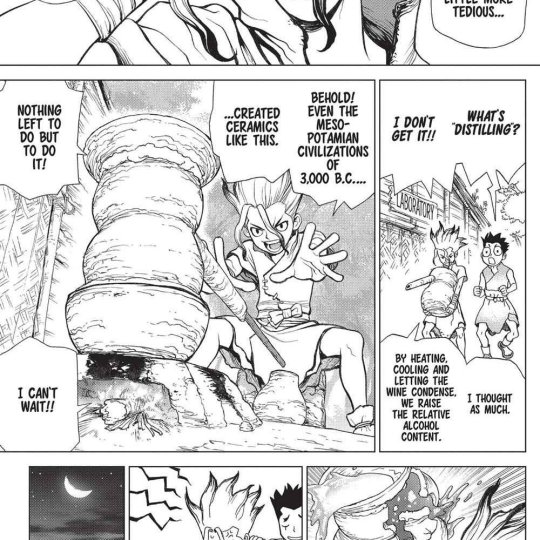
Either the distilling setup broke a second time, or they decided to upgrade sometime during the winter.

Another early technique: ice fishing using a spear.
Evidence has been found showing this method being used over 2000 years ago by natives in North America. Improvements have been made over the years, but Taiju is shown using the most basic form of it (no bait or shelter).

Taiju seems to think Yuzuriha hates beards, I wonder if that's true...
I also wonder if Taiju will grow a beard again in the future or not.

If the whole bird species was petrified, that means this bird is the only one of its kind alive right now. Is Sparrow Ishigami ready to bring back all of sparrowkind?

Senku's comment here includes the 6 months he spent surviving alone, as it's only spring.
(Senku breaks out spring 5738, Taiju breaks out 6 months later on Oct 5th 5738. This scene is during spring 5739.)
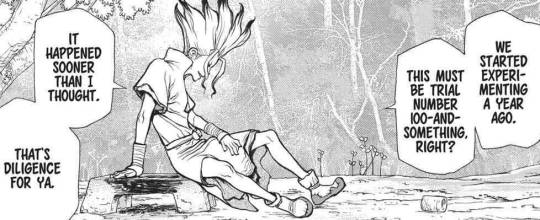
Senku says Taiju can pick who they revive next, but there was really never any doubt. Yuzuriha is their mutual friend, and Senku doesn't seem to have anyone other than Taiju that he'd want to revive.
They also can't revive their parents...
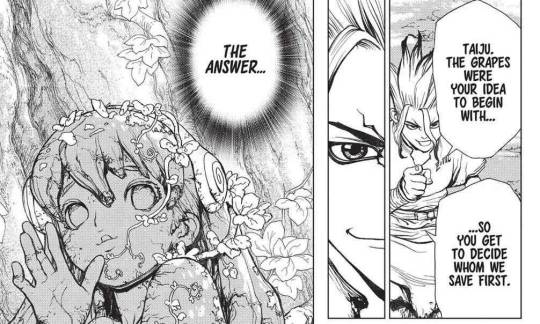
I really love these early chapters where everything they do requires a lot of effort and it's all being shown.
14 notes
·
View notes
Note
5 15 20 !!!
5 - favorite form of potato?
ooh okay told jules that it was scalloped potatoes when they asked so. taking this as an opportunity to name another one. my BASIC potato fave is tater tots for SURE. little slice of heaven right there. perfect addition to any meal, fulfills snacking urge cause they're so bite sized and delightful, they're like hashbrowns but you get a more consistent crispy to soft potato ratio... plus sonic (the restaurant. not the guy) has chili cheese tots that are like. disgusting but in an awesome way. you know. shout out american fast food i love to get chili cheese tater tots and a ridiculous grape slushy with fucking. nerds in it. meal to make your stomach churn but god if it isn't good
15 - rank the methods of death: freezing, burning, drowning
didn't look at the numbers you sent before i went to send you one in return and i think i immediately picked this same one 😭 um anyway. freezing is the best option for sure. the thing about burning and drowning is that it gives you time to Panic where if you freeze you could just go to sleep... i have always been a "make it quick" guy when it comes to imagining my own death. very consistent about Not wanting to drown or burn 😭
for the other two though. i think drowning is preferable because it is theoretically less painful. however burning is sexier. my final word on the matter
20 - favorite disney princess movie?
tee heeeeeeee sleeping beauty :3 i am a prince phillip boy and i think aurora's design is just gorgeous and i love the art style of the movie. i didn't actually watch it that often growing up i've only seen it two or three times but i do love it very much... just don't watch movies that often...
in terms of disney princess movies that i Did watch often as a kid cause we had them on vhs. mulan. i think we get the reasoning there skfgjh
weirdly specific and unrelated asks to know someone well :)
#did NOT really enjoy watching beauty and the beast because belle was one of those characters who was just like me#and as i later figured out. it made me Super uncomfortable to see a character who was visibly like me and also a girl#because the thought of being compared to that character was really stressful. so. brown haired book girl could NOT live in my house#lest i be compared to her. because i could not articulate it at the time but i knew was NOT like her.#hashtag transgenderism. anyway#ask#ask game
5 notes
·
View notes